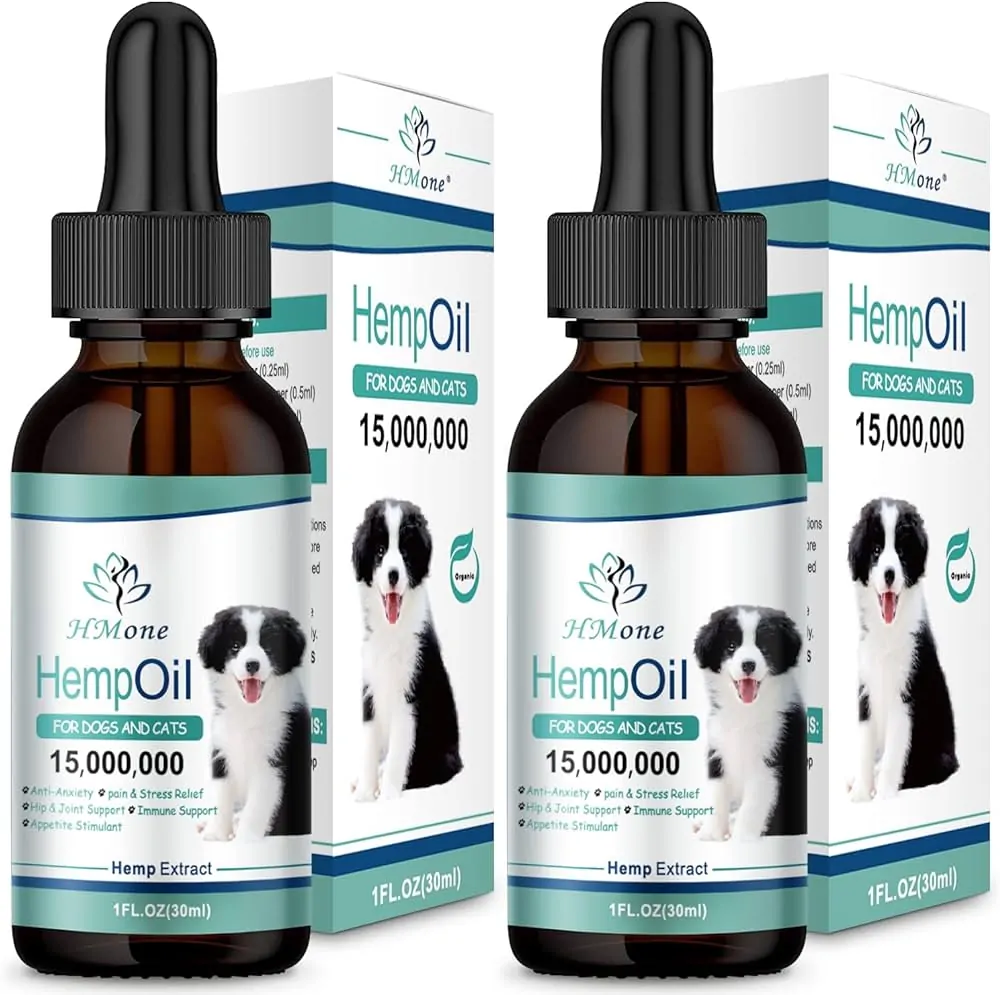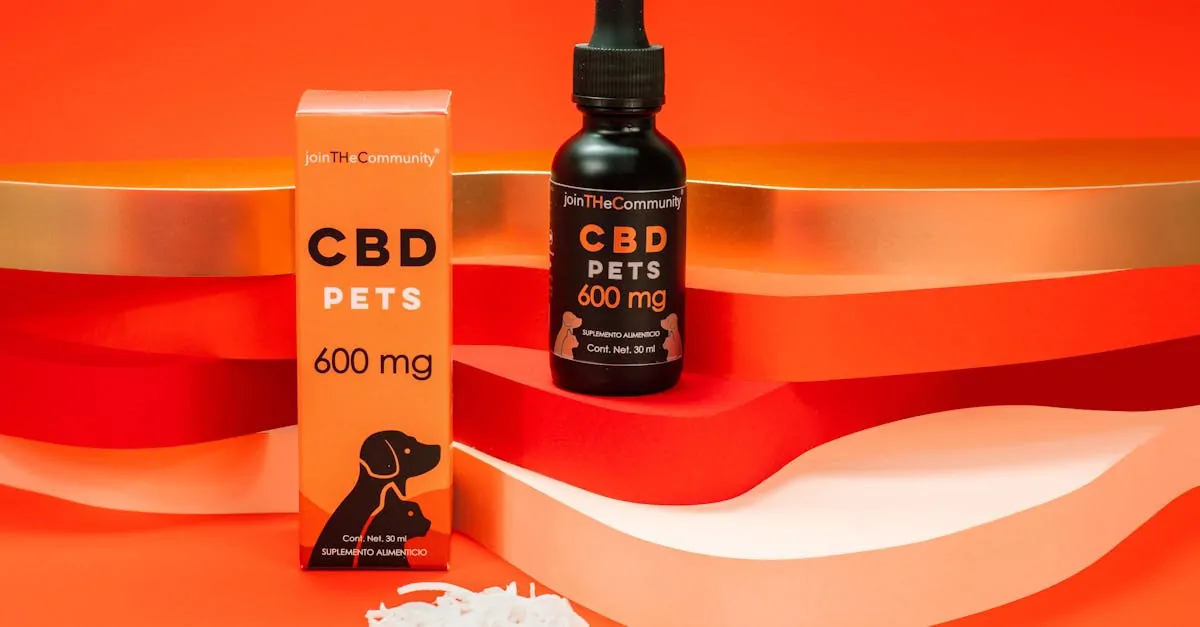CBD Oil for Dogs: Benefits, Safety, and How It Works
Discover how CBD oil can enhance your dog’s well-being with stress reduction, pain relief, and seizure control. Learn about safe usage and consult your vet today!
Have you ever wondered if there’s a natural way to support your furry friend’s health and well-being? CBD oil for dogs has been gaining popularity among pet owners, and for good reason. This hemp-derived compound offers a range of potential benefits for our canine companions, from easing stress to supporting joint health.
CBD oil for dogs is a natural extract containing cannabidiol, a non-psychoactive compound found in hemp plants. It’s typically mixed with a carrier oil for easy administration. Unlike its cousin THC, CBD won’t get your dog “high” but may provide various therapeutic effects. In fact, a study published in the Journal of the American Veterinary Medical Association found that CBD reduced seizures in 89% of dogs tested.
In this text, we’ll explore what CBD oil is, how it works, and the potential benefits it offers for dogs. We’ll also discuss proper dosing, safety considerations, and how to choose the right product for your four-legged friend. Let’s immerse and discover if CBD oil might be the natural solution you’ve been looking for to support your dog’s health and happiness.
What Is CBD Oil for Dogs?
CBD oil for dogs is a natural extract derived from the hemp plant, specifically from Cannabis sativa. It contains cannabidiol (CBD), a non-psychoactive compound that offers potential health benefits for canines without the intoxicating effects associated with marijuana.
The oil is typically made by extracting CBD from hemp plants and diluting it with a carrier oil, such as coconut or hemp seed oil. This process creates a product that’s easy to administer and can be readily absorbed by a dog’s body.
CBD oil interacts with the endocannabinoid system in dogs, which plays a crucial role in maintaining various physiological processes. This interaction may contribute to its potential therapeutic effects.
Research has shown promising results for CBD oil in managing several canine health issues:
- Stress reduction: Studies indicate that CBD can significantly lower stress levels in dogs, particularly in situations like car travel or being left alone.
- Pain management: CBD has demonstrated effectiveness in reducing pain and increasing activity in dogs with conditions like osteoarthritis.
- Seizure control: When used alongside traditional anti-seizure medications, CBD has shown potential in reducing seizure frequency in dogs with idiopathic epilepsy.
It’s important to note that while CBD oil for dogs is derived from the cannabis plant, it contains less than 0.3% THC, the psychoactive compound found in marijuana. This trace amount ensures that the oil won’t produce a “high” in dogs.
When considering CBD oil for your dog, it’s crucial to choose a product specifically formulated for canine use. Human CBD products may contain ingredients that are harmful to dogs or have THC levels that are unsafe for pets.
Quality CBD oil for dogs should:
- Be sourced from organic, U.S.-grown hemp
- Contain a carrier oil suitable for dogs
- Be free from artificial additives and GMOs
- Come with a Certificate of Analysis (COA) from third-party lab testing
While CBD oil shows promise for various canine health issues, it’s essential to consult with a veterinarian before starting any new supplement regimen for your dog. They can provide guidance on dosage, potential interactions with other medications, and whether CBD oil is appropriate for your dog’s exact health needs.
How CBD Oil Works in Dogs
CBD oil interacts with dogs’ bodies through a complex network of receptors and chemicals. Understanding this interaction helps explain the potential benefits of CBD for canine health.
The Endocannabinoid System
The endocannabinoid system (ECS) plays a crucial role in how CBD oil affects dogs. This system is present in all mammals, including humans and canines. Here’s what you need to know about the ECS:
- Function: The ECS helps maintain balance (homeostasis) in the body, regulating various physiological processes.
- Components: It consists of three main elements:
- Endocannabinoids: Naturally occurring compounds in the body
- Receptors: CB1 and CB2 receptors found throughout the body
- Enzymes: Responsible for breaking down endocannabinoids
- CB1 Receptors: Located primarily in the brain and central nervous system, these receptors influence mood, pain perception, and cognitive functions.
- CB2 Receptors: Found mainly in the peripheral nervous system and immune cells, these receptors play a role in inflammation and immune response.
- CBD Interaction: Unlike THC, CBD doesn’t directly bind to these receptors. Instead, it influences the ECS indirectly by:
- Improving the body’s natural endocannabinoids
- Modifying receptor activity
- Inhibiting enzymes that break down endocannabinoids
By interacting with the ECS, CBD oil can potentially help regulate various bodily functions in dogs, including pain sensation, mood, appetite, and immune response. This interaction forms the basis for many of the reported benefits of CBD oil for dogs.

Potential Benefits of CBD Oil for Dogs
CBD oil offers several potential benefits for dogs, addressing various health concerns. Research suggests that it may help with pain management, anxiety relief, and seizure control. Let’s explore these benefits in detail.
Pain Management
CBD oil shows promise in managing pain for dogs, particularly those suffering from arthritis and other chronic conditions. A Cornell University study found that over 80% of dogs with osteoarthritis experienced decreased pain after using CBD oil, leading to improved comfort and activity levels. CBD interacts with the endocannabinoid system, potentially reducing inflammation and alleviating discomfort. It’s especially effective for:
- Arthritis pain
- Neuropathic pain
- Hip and elbow dysplasia
- Sprains and strains
Many pet owners report that their dogs show increased mobility and a better quality of life after incorporating CBD oil into their pain management routine.
Anxiety Relief
CBD oil can be beneficial for managing anxiety and stress in dogs. It interacts with the dog’s endocannabinoid system, which helps regulate mood and emotional balance. This interaction may lead to:
- Reduced stress during thunderstorms or fireworks
- Decreased separation anxiety
- Improved behavior in social situations
- Calmer demeanor during travel or vet visits
The calming effects of CBD oil can help dogs feel more relaxed without the sedative effects of traditional anti-anxiety medications. Many pet owners find that CBD oil helps their dogs cope better with stressful situations, leading to a more balanced and content pet.
Seizure Control
CBD oil shows potential in controlling seizures in dogs, particularly those with epilepsy. Studies have demonstrated that CBD can significantly reduce the frequency and severity of seizures in some dogs. Benefits may include:
- Decreased seizure frequency
- Reduced severity of seizure episodes
- Improved overall quality of life
A Colorado State University study found that 89% of dogs with epilepsy experienced a reduction in seizure frequency when given CBD oil. While more research is needed, many veterinarians and pet owners report positive outcomes when using CBD oil as part of a comprehensive seizure management plan. It’s important to note that CBD should be used under veterinary supervision, especially when combined with other anti-epileptic medications.
Safety and Side Effects
CBD oil for dogs has gained popularity as a natural supplement, but it’s essential to understand its safety profile and potential side effects. Let’s explore these aspects in detail.
Is CBD Oil Safe for Dogs?
CBD oil is generally considered safe for dogs when administered correctly. Studies have shown that CBD is well-tolerated by canines, with minimal adverse effects reported. But, it’s crucial to consult a veterinarian before introducing CBD oil to your dog’s regimen. Vets can provide guidance on proper dosing and potential interactions with other medications. Quality matters too; choose CBD oil sourced from organic hemp and tested by third-party laboratories to ensure purity and potency. Always start with a low dose and gradually increase it while monitoring your dog’s response.
Possible Side Effects
While CBD oil is typically safe, some dogs may experience mild side effects. These can include:
- Dry mouth: CBD may decrease saliva production, leading to increased thirst.
- Drowsiness: Some dogs may become slightly lethargic, especially with higher doses.
- Lowered blood pressure: A temporary drop in blood pressure can cause light-headedness.
- Changes in appetite: CBD may increase or decrease appetite in some dogs.
- Diarrhea: Gastrointestinal upset can occur, particularly when first introducing CBD oil.
These side effects are usually mild and temporary. If any persist or worsen, discontinue use and consult your veterinarian. It’s important to note that CBD can interact with certain medications by affecting liver enzymes involved in drug metabolism. This interaction underscores the importance of veterinary supervision when using CBD oil for dogs, especially those on other medications.

Choosing the Right CBD Oil
Selecting the appropriate CBD oil for your dog is crucial for ensuring safety and effectiveness. We’ll explore key factors to consider when making your choice.
Quality Considerations
When choosing CBD oil for dogs, quality is paramount. Look for products sourced from organic, USDA-certified hemp farms in the United States. This ensures the oil is free from pesticides, fungicides, and solvents. Avoid cheaper options that may contain toxic substances like heavy metals.
Always request a certificate of analysis from the manufacturer. This document certifies the amount of CBD in the product and confirms the absence of THC. Many CBD products contain only small amounts of CBD, so verification is essential.
Opt for CBD oil in liquid form rather than dog treats. This allows for precise dosage adjustments. Look for the National Animal Supplement Counsel (NASC) Seal of Quality Assurance, which indicates adherence to strict quality standards.
Full Spectrum vs. Isolate
CBD oil for dogs comes in two main types: full spectrum and isolate. Full spectrum CBD contains all cannabinoids and terpenes found in the hemp plant, potentially offering enhanced benefits through the “entourage effect.” This synergistic interaction between compounds may increase CBD’s effectiveness.
Isolate, on the other hand, contains only pure CBD. While it lacks additional cannabinoids, it’s THC-free and may be preferable for dogs sensitive to other hemp compounds.
When selecting full spectrum products, ensure they contain no THC, as it’s toxic to pets. Avoid products formulated for human consumption, which may include harmful ingredients like xylitol.
Eventually, the choice between full spectrum and isolate depends on your dog’s exact needs and sensitivities. Consult with your veterinarian to determine the best option for your pet.
Proper Dosage and Administration
Administering CBD oil to dogs requires careful consideration of dosage and method. We’ll explore how to determine the correct dose and various administration techniques to ensure your dog receives the maximum benefits of CBD oil.
Determining the Correct Dose
CBD dosage for dogs depends on factors like weight, condition severity, and individual response. Studies show that 4 mg/kg body weight per day is safe and effective for long-term use. For example, a 20 kg dog would receive 80 mg of CBD daily. Start with a lower dose and gradually increase, observing your dog’s response. A clinical trial found CBD oil reduced seizure frequency in dogs with idiopathic epilepsy, though optimal dosing for this condition is still being researched. Always consult your veterinarian before starting CBD treatment, as they can provide personalized dosage recommendations based on your dog’s exact needs and health status.
Methods of Administration
CBD oil for dogs can be administered in several ways, each with its own advantages. The most common methods include:
- Oral drops: Place CBD oil directly into your dog’s mouth or mix with food. This method allows for precise dosing and quick absorption.
- Treats: CBD-infused treats offer a convenient and tasty option, especially for picky eaters.
- Topical application: Apply CBD-infused balms or creams directly to your dog’s skin for localized relief.
- Capsules: Easy to administer and provide consistent dosing, ideal for dogs who don’t mind swallowing pills.
- Infused food: Mix CBD oil with your dog’s regular food for seamless integration into their diet.
When administering CBD oil, consistency is key. Establish a regular dosing schedule and monitor your dog’s response. Some dogs may show improvement within hours, while others may take several days or weeks to experience full benefits. Adjust the dosage or administration method as needed, always under veterinary guidance. Remember that CBD oil’s effectiveness can vary depending on the quality of the product and your dog’s individual physiology.
Legal and Regulatory Aspects
Source of CBD Oil
CBD oil for dogs comes from hemp plants containing less than 0.3% THC. This low THC content distinguishes hemp-derived CBD from marijuana-derived CBD, impacting its legal status. Hemp plants provide a legal source for CBD oil, making it widely available for pet owners seeking natural alternatives for their dogs’ health.
Legal Status
The 2018 Farm Bill clarified hemp’s legal status, removing it from the controlled substances list. This change effectively legalized hemp-derived CBD oil in most states. But, it’s important to note that while CBD oil for dogs is legal, regulations vary by state. Pet owners should check local laws before purchasing or using CBD products for their canine companions.
Regulatory Oversight
The FDA hasn’t approved CBD for use in dogs, nor provided dosing guidelines. This lack of regulatory oversight means CBD products for pets aren’t held to the same standards as pharmaceuticals. Pet owners must exercise caution when selecting CBD oil for their dogs, relying on reputable manufacturers and third-party testing to ensure product quality and safety.
To navigate the complex legal and regulatory industry of CBD oil for dogs, we recommend:
- Choosing hemp-derived CBD products with less than 0.3% THC
- Verifying the legal status of CBD in your state
- Selecting products from reputable manufacturers with third-party testing
- Consulting with a veterinarian before starting a CBD regimen for your dog
By understanding these legal and regulatory aspects, pet owners can make informed decisions about using CBD oil for their dogs’ health and wellness needs.
What Veterinarians Say About CBD Oil for Dogs
Veterinarians’ perspectives on CBD oil for dogs are evolving as research progresses. Many vets recognize the potential benefits of CBD oil but emphasize the need for more comprehensive studies.
Current Veterinary Stance
Veterinarians generally acknowledge the potential of CBD oil in managing various canine health issues. But, they stress the importance of scientific evidence to support its use. Here’s what vets are saying:
- Pain Management: Many vets report positive outcomes in using CBD oil for dogs with chronic pain, especially those with osteoarthritis.
- Anxiety Relief: Some veterinarians note improvements in dogs with anxiety when using CBD oil, particularly for situational stress.
- Seizure Control: A growing number of vets are cautiously optimistic about CBD’s potential in managing canine epilepsy.
Research-Backed Opinions
Veterinarians base their opinions on emerging research:
- Arthritis Study: A Cornell University study found that dogs receiving 2 mg/kg of CBD twice daily showed important improvement in pain relief and quality of life.
- Epilepsy Research: The Journal of the American Veterinary Medical Association published a study showing that 89% of dogs experienced reduced seizure frequency when given CBD oil.
Veterinary Cautions
While many vets are open to CBD oil’s potential, they also express several cautions:
- Lack of Regulation: Vets warn about the inconsistent quality of CBD products due to limited FDA oversight.
- Potential Side Effects: Some veterinarians report mild side effects in dogs, including drowsiness and changes in appetite.
- Drug Interactions: Vets stress the importance of monitoring potential interactions between CBD oil and other medications.
Legal Considerations
Veterinarians must navigate complex legal landscapes:
- State Regulations: Laws about CBD oil for dogs vary by state, affecting vets’ ability to recommend or prescribe it.
- Professional Guidelines: Many veterinary associations are still developing official stances on CBD use in pets.
Future Outlook
Most veterinarians agree on the need for more research:
- Clinical Trials: Vets are calling for more extensive clinical trials to establish dosing guidelines and long-term effects.
- Standardization: Many veterinarians advocate for standardized production and testing of CBD products for pets.
As research progresses, veterinarians continue to approach CBD oil for dogs with cautious optimism. They emphasize the importance of consulting with a veterinarian before starting any CBD regimen for pets.
Conclusion
CBD oil for dogs shows promising potential in supporting canine health and well-being. We’ve explored its benefits for pain management anxiety relief and seizure control. While generally safe it’s crucial to choose high-quality products and consult with a veterinarian. As research continues to evolve we expect to see more comprehensive studies on CBD’s effects on dogs. By staying informed and working closely with veterinary professionals pet owners can make the best decisions for their furry companions’ health. Remember that every dog is unique and what works for one may not work for another. Always prioritize your pet’s safety and well-being when considering CBD oil as a supplement.

